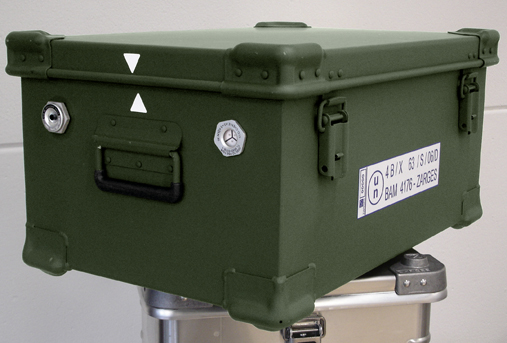As the International Air Transport Association (IATA) tightens its regulations on how lithium-ion batteries can be shipped by air, it’s more important than ever to purchase shipping cases that give you full compliance with IATA requirements. It’s also important to know a little about the regulations.
More stringent regulations from the IATA and the FAA are the result of an increasing number of unsafe incidents with the batteries during air transit. For this reason, manufacturers, retailers and individuals who ship lithium-ion batteries must be careful to ensure that their shipping containers are in full compliance with IATA Dangerous Goods Regulations.

Where lithium-ion batteries are found
Most commercial shippers of these batteries know ahead of time which of their products contain them. The individual shipper, however, may inadvertently engage in unlawful shipping by not knowing what kind of battery is in the items he or she is shipping.
Lithium-ion batteries are commonly found in:
- Laptop computers
- Tablets
- Cell phones
- Cameras
- Toys
- Watches
- Battery-driven power tools
- Even some greeting cards
It’s therefore wise to fully understand the battery components of any product you intend to ship so you can make sure to comply with IATA battery-shipping regulations.
Types of lithium batteries addressed in the IATA regulations
- IATA lists several battery types that fall under its regulatory guidelines when being shipped by air along with regulations governing how shipping may be done:
- Lithium-ion battery prototypes (i.e., battery products in the development stage)
- Batteries that weigh more than 35 kilograms – approval is required to ship these batteries
- Batteries that are damaged or defective may not be shipped by air under any circumstances
- Electrical batteries that could become hot in transit must be prepared for shipping in a way that prevents a short-circuit
- Batteries being recycled cannot be shipped by air without approval of an authority from the state/region in which the batteries are located, and in some cases by the state/region to which the batteries are being shipped
- Unless approved by a state authority, lithium-ion batteries cannot be shipped by passenger aircraft – only cargo planes may transport these batteries
- The IATA states: “lithium-ion cells and batteries must be shipped at a state of charge (SoC) not exceeding 30% of their rated design capacity.” Exceptions can be made if approval is granted by the state of origin and the state of the operator.
The right shipping cases for lithium-ion batteries
In addition to the regulations above, there are various requirements in place for the types of shipping cases that can be used to transport lithium-ion batteries by air.
When purchasing transit cases for batteries, you’ll be best-served by consulting a shipping case retailer/customizer who is familiar with IATA and other regulations governing the transport of lithium-ion batteries and the products that contain them.
A professional customizer can outfit any quality standard case to not only comply with federal regulations for air transport but also to keep your products safe and secure in transit.
Cases2Go, based in Tampa, FL, is Florida’s largest shipping case dealer with more than 35 years’ experience in the industry. We understand lithium-ion battery shipping, and our ISO-certified team can provide you with the shipping containers and advice you need to keep your products safe and keep you in compliance with federal air-shipping regulations. We’re standing by at (800) 636-1690.